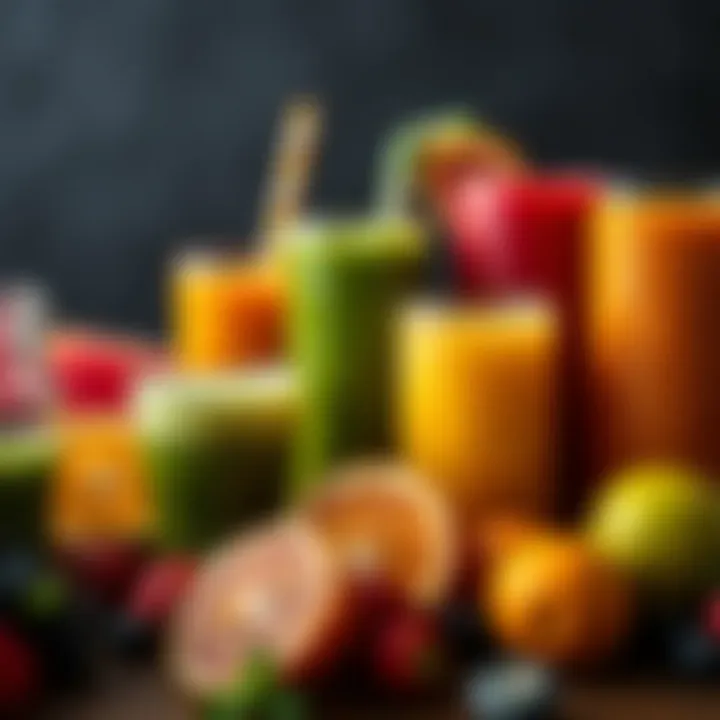Hydration Strategies for Hangover Relief and Recovery


Intro
After a night of socializing, many people wake up to the unwelcome presence of a hangover. It's a bit like being forced to step into an unwanted pair of shoes—tight, uncomfortable, and just plain annoying. One of the most significant aspects of recovering from this ordeal is hydration. Understanding what to drink and why it can make all the difference in alleviating those relentless symptoms.
In this guide, we will delve into effective beverage options that not only hydrate but also replenish nutrients and ease digestive discomfort. This comprehensive piece is particularly aimed at health professionals, wellness coaches, nutritionists, fitness trainers, and mindfulness instructors looking to enhance their understanding and effectiveness in supporting individuals post-alcohol consumption. Let's explore these optimal choices that can aid in recovery and promote overall well-being.
Intro to Hangovers
When drinking alcohol, many individuals look for a good time. However, the aftermath can be less than enjoyable. Understanding hangovers, their causes, and remedies is key for anyone who consumes alcohol regularly. This section sets the foundation for exploring optimal hydration as a remedy for hangover symptoms. Knowing what happens in the body during a hangover can help you make informed choices about your recovery.
Understanding the Hangover Phenomenon
A hangover is not merely a bad headache or nausea; it involves a complex interplay of biochemical reactions happening in your body. After consuming alcohol, dehydration is one of the first responses. Alcohol is a diuretic, meaning it promotes urination, which can lead to loss of essential fluids. This dehydration saps your energy and can disrupt various bodily functions.
Even beyond dehydration, alcohol affects neurotransmitters in the brain, leading to mood changes, irritability, and fatigue. When the body processes alcohol, it produces acetaldehyde, which is a toxic byproduct. This is what contributes to symptoms like headaches, sweating, and even the dreaded sensitivity to light and sound. If you’ve ever felt like you were hit by a bus the day after a night of revelry, you’re not alone.
Common Symptoms and Their Causes
The symptoms of a hangover are diverse, ranging from the annoyances of a headache to the debilitating effects of nausea. Here are some commonly experienced symptoms:
- Headaches: Often caused by dehydration and the effects of acetaldehyde.
- Nausea: Your stomach lining may become irritated, leading to a queasy feeling.
- Fatigue: A drop in blood sugar and the body’s intensive work to detoxify can lead to exhaustion.
- Thirst: An unmistakable sign of dehydration.
- Sensitivity to Light and Sound: The brain is on overdrive trying to cope, making you more sensitive to stimuli.
Understanding these symptoms provides valuable information for tackling hangover recovery strategies. For instance, addressing dehydration is often one of the most straightforward and effective methods to alleviate feelings of discomfort. Keeping hydrated can also improve mood and energy levels, making the recovery process significantly easier.
The Importance of Hydration
Hydration stands as a cornerstone in the quest for recovery from hangovers. Understanding the importance of hydration helps illuminate how our bodies respond to alcohol and why proper fluid intake becomes a priority post-intoxication. Alcohol is a diuretic; it encourages the body to lose more fluids than it gains. This can leave one feeling like a wilted plant, desperately in need of water. Proper hydration aids in flushing out toxins, replenishing lost electrolytes, and restoring balance.
Role of Water in Recovery
Water often gets the lip service it deserves but is largely overlooked when people seek to remedy hangover symptoms. Water plays a vital role in transporting nutrients, regulating body temperature, and, most importantly, helping our bodies recover from the dehydrating effects of alcohol.
Consider this: even mild dehydration can make hangover symptoms like headaches and fatigue feel ten times worse. Drinking sufficient water can help mitigate these discomforts.
One effective method is to keep a glass of water handy while consuming alcoholic beverages. This practice not only encourages drinking water between drinks but also serves as a reminder to prioritize hydration. After a night out, a substantial intake of water the following day is crucial. Aim for at least 8 to 10 glasses in the first few hours, which can help the body regain its lost moisture.
Electrolyte Replenishment
Electrolytes are the unsung heroes in the recovery narrative following a hangover. These minerals regulate multiple bodily functions, including muscle contractions and hydration levels. Think of them as the body's internal balance-keepers.
When alcohol consumption increases, the body experiences a depletion of essential electrolytes, particularly sodium, potassium, and magnesium. Their absence can lead to cramping, weakness, and intense headaches. Therefore, rehydrating with fluids rich in electrolytes is necessary to restore this balance.
High-quality sports drinks can serve this purpose well, but it's essential to choose wisely. Look for options with low sugar content and balanced electrolytes, steering clear from excess additives. Coconut water stands out here as a natural alternative, bursting with potassium and other minerals without the added sugars found in many commercial sports drinks.
A smart choice is to rotate drinks; intersperse water and electrolyte-rich beverages to maximize hydration. This approach can hasten recovery by balancing both fluid intake and electrolyte levels, thus ensuring your body gets the best of both worlds as it fights against the hangover blues.
Classic Stay-Hydrated Options
When it comes to recovering from a hangover, selecting the right beverages is essential to restoring balance and comfort. Classic stay-hydrated options are pivotal, not only for quenching thirst but also for replenishing lost nutrients and electrolytes. These beverages serve as the foundation of recovery after excessive alcohol consumption, helping you feel more human again. Proper hydration is key to alleviating many hangover symptoms, such as headaches and fatigue, allowing your body to rejuvenate.
Plain Water: The Essential Choice
Let's start with the simplest option: plain water. Often underrated yet so crucial, water is the primary method for rehydrating the body post-alcohol indulgence. Alcohol can lead to dehydration, as it increases urine production and hinders the body’s ability to absorb water. By choosing to sip on plain water, you are directly tackling dehydration head-on.
- Water effectively flushes out toxins and helps your organs, especially the kidneys, function properly.
- It's calorie-free, making it a perfect choice for those who want to avoid added sugars that can exacerbate hangover symptoms.
- One practical tip is to keep a water bottle within arm's reach, encouraging you to drink often throughout the day.
This simple liquid can make a world of difference in your recovery journey. Don’t wait until you feel parched; staying ahead by drinking water can significantly hasten your body's return to normalcy.
Coconut Water: Natural Electrolyte Source


Next up is coconut water, often hailed as nature’s sports drink. This delightful option not only hydrates but also replenishes electrolytes lost due to dehydration. It’s filled with potassium, sodium, and magnesium—key components that help restore balance in your system after a night out.
- The slightly sweet taste makes it a more appealing alternative to plain water for some, while still offering a much lower sugar content than traditional sports drinks.
- Many find that coconut water aids digestion, as it is less acidic and can settle an upset stomach—a common affliction after a heavy drinking session.
- Opting for young coconut water, if accessible, might give you the freshest taste and nutrients.
Coconut water is more than just a hydration booster; it can be a strategic ally in your recovery arsenal. Consider it a delightful alternative that your body will thank you for.
In summary, selecting beverages like plain water and coconut water can significantly ease hangover symptoms through effective hydration and electrolyte replenishment.
Both options offer a straightforward approach: hydrate, feel better, and start working your way back to feeling yourself again.
Fruit and Vegetable Juices
When it comes to recovering from a hangover, fruit and vegetable juices stand out as potent allies. Their blend of hydration, vitamins, and antioxidants can provide much-needed relief during those rough mornings after a night of indulgence. Not only do they help rehydrate, but they also deliver minerals and nutrients that can ease symptoms and aid in recovery. Let’s dive deeper into specific juicy options that might just become your go-to remedies.
Orange Juice: Vitamin Boost
Orange juice is more than just a popular breakfast staple; it's a powerhouse of vitamin C. This vitamin is renowned for its role in bolstering the immune system and may also help mitigate some hangover effects. When alcohol enters the system, it creates an inflammatory response that can leave the body in a state of flux. Vitamin C can serve as a vital nutrient that soothes the body’s recovery process. Additionally, orange juice is hydrating, which is essential when dealing with dehydration that comes after drinking alcohol.
Consider opting for freshly squeezed orange juice. The process of juicing helps retain the pulp, providing fiber that aids digestion. This can be particularly beneficial as it might help soothe an upset stomach, something many experience following excessive drinking.
Tomato Juice: Rehydration and Nutrients
Tomato juice is often overlooked, yet it also deserves a spot on the list of effective hangover remedies. Rich in vitamins A and C, along with potassium and magnesium, it replenishes electrolytes lost during alcohol consumption. Particularly, potassium is crucial since it is one of the key electrolytes affected after drinking, and its deficiency can cause fatigue and muscle weakness.
The presence of lycopene, an antioxidant found in tomatoes, not only contributes to overall health but may also combat oxidative stress caused by alcohol. The saltiness of many commercial tomato juices can further contribute to electrolyte balance, making it a comforting choice for those feeling drained.
Beet Juice: Enhancing Circulation
Beet juice may seem like a niche choice, but its benefits are impressive. This vibrant juice has been associated with improved circulation and energy levels. Beets are rich in nitrates, which convert into nitric oxide in the body, leading to vasodilation, or the widening of blood vessels. This can enhance blood flow and, consequently, alleviate hangover symptoms such as headaches and fatigue.
Furthermore, beet juice is packed with antioxidants which can aid in detoxifying the liver, an organ that is often bogged down after a night of drinking. While the taste might take some getting used to, mixing it with other juices like apple or carrot can help mask its earthy flavor while providing additional vitamins and hydration.
Each of these fruit and vegetable juices offers unique benefits that can effectively help the body recover from a hangover. Including them in your hydration strategy post-party can make a significant difference in how one feels the next day.
Herbal Teas and Infusions
Herbal teas and infusions play a vital role in the recovery process following a hangover. Their significance lies not only in hydration but also in the array of health benefits they offer. Unlike traditional caffeinated beverages, herbal teas provide a soothing alternative that can help alleviate some of the discomfort associated with hangovers. From settling an upset stomach to calming a racing mind, these beverages are a gentle remedy worth considering.
However, the choice of tea is crucial. Each herbal infusion comes with its own set of benefits that can tackle specific hangover symptoms effectively. Incorporating these teas into your recovery routine can contribute to your overall well-being, especially when paired with other hydrating options.
Ginger Tea: Settling the Stomach
Ginger tea is an excellent choice for those dealing with nausea or upset stomach typical after a night of drinking. Ginger, a root known for its medicinal properties, has a long-standing reputation for aiding digestion. Its active compounds, like gingerol and shogaol, have anti-inflammatory properties that can help soothe the stomach muscles and promote bile production, which aids digestion.
- How to prepare ginger tea: Simply steep fresh ginger slices in hot water for about 10 to 15 minutes. Add honey or lemon to taste, if desired.
By indulging in this warming beverage, one may find not only relief from nausea but a comforting ritual that helps ground oneself after the chaos of a hangover.
Peppermint Tea: Relieving Headaches
If headaches are what you’re grappling with, peppermint tea might just do the trick. The menthol present in peppermint has a cooling effect and can help to relax muscles. This is essential since tension headaches are common after heavy drinking. Furthermore, the aroma of peppermint itself can help clear the mind, providing mental clarity, which often gets clouded after a night of indulgence.
- Preparation tips for peppermint tea: Steep either dried peppermint leaves or a peppermint tea bag in boiling water for around 5 to 10 minutes. This can also be consumed cold for a refreshing twist.
Drinking peppermint tea is not only soothing for headaches, it can also invigorate the senses, enabling a quicker return to normalcy.
Chamomile Tea: Promoting Relaxation
Chamomile tea is renowned for its calming properties. After a hangover, one may experience irritability or anxiety, and chamomile can help smooth out those rough edges. It acts as a mild sedative, aiding in relaxation and encouraging restful sleep—something that often eludes those recovering from hangovers.
- Brewing chamomile tea: Use chamomile flowers or tea bags and steep in hot water for about 5 to 10 minutes. For added flavor, consider a splash of honey or a thin slice of lemon.


In summary, chamomile tea serves as a comforting hug in a mug, providing not just hydration but also a means to unwind and recharge.
Incorporating herbal teas into your hydration regimen can significantly enhance your hangover recovery. Focus on those teas that target your specific symptoms for optimal results, and remember, it's not just about quenching thirst; it's about nourishing your body back to health.
By exploring these herbal options, individuals can not only address immediate hangover symptoms but also embrace a healthier, more mindful approach to hydration.
Sports Drinks: Pros and Cons
Sports drinks are often touted as a quick fix for dehydration and electrolyte loss, especially in the wake of a hangover. They are formulated to replenish both fluids and minerals, crucial for recovery. However, one must consider the benefits and drawbacks of incorporating these drinks into their hydration strategy post-alcohol consumption.
Replenishing Lost Electrolytes
After a night out, a person's body may be operating in a deficit. Hangovers commonly lead to the depletion of vital electrolytes like sodium, potassium, and magnesium, which play significant roles in maintaining hydration and overall bodily functions. Drinking sports beverages can be an effective way to replenish these lost electrolytes.
- Effective Composition: Most sports drinks contain a blend of electrolytes, designed to mimic the electrolytic balance naturally found in the body. This is important for restoring hydration after alcohol's dehydrating effects.
- Rapid Absorption: These drinks often feature a mixture of sugars and salts, enhancing their absorption rate. Consuming them can expedite the recovery process, particularly when you feel like a worn-out sponge.
- Convenience: Sports drinks are easy to find, often stocked in convenience stores and supermarkets. This makes grabbing a bottle feasible when you're feeling less than vibrant.
Nevertheless, while replenishing electrolytes is key, it is essential to consider the associated implications these drinks bring along.
Considering Added Sugars
One cannot overlook the fact that many sports drinks come packed with sugars, which may not be helpful after consuming alcohol.
- Added Sugars: Some popular brands are loaded with high-fructose corn syrup or similar sweeteners. This sugar content can further exacerbate dehydration, giving you a double whammy effect. Just when you think you’re hydrating, you might be unintentionally inviting more trouble.
- Caloric Concerns: If you're a health-conscious individual or simply mindful about caloric intake, these added sugars can hinder recovery. They can contribute to unwanted weight gain and other metabolic issues.
- Taste but Not Necessarily Nourishment: While a sweetened beverage might taste good at first sip, such drinks might lack essential nutrients compared to other beverage options like coconut water or natural juices.
In summary, sports drinks can serve as a quick remedy for rehydration, especially for those needing quick recovery from lost electrolytes. However, due diligence on sugar content should not be disregarded, particularly when considering long-term well-being. It's about striking a balance—using sports drinks wisely while also exploring other hydration avenues might pave the road to a more effective recovery.
"An informed choice is the best choice; when it comes to hydration after a hangover, understanding both sides can lead to smarter decisions."
For further reading on hydration and health impacts, consider checking out resources from Harvard Health or Mayo Clinic.
Alternative Approaches to Hydration
After a night of indulgence, typical remedies often focus on rehydration with basic fluids. However, exploring alternative hydration methods can offer more nuanced benefits that not only nurture the body but may also enhance recovery from hangover symptoms. This section delves into two approaches: broths and infused waters, each bringing unique attributes to the table.
Broths: Nourishing and Salty
Broths have been a staple in many cultures for their restorative characteristics. Beyond just being warm and comforting, broths deliver a potent combination of hydration, electrolytes, and nutrients. During a hangover, your body likely feels depleted, and the salty nature of broths can help restore sodium levels that may have dwindled from alcohol consumption.
A well-prepared broth—whether beef, chicken, or vegetable—comes packed with vitamins and minerals. These nutrients can assist in stabilizing your body's functions, aiding digestion, and soothing stomach discomfort, which is often part and parcel of a hangover experience. Furthermore, the warm temperature of broth can be soothing and help stimulate gastric juices, promoting better digestion.
Here are a few considerations when using broth as a hangover remedy:
- Choose homemade: Store-bought varieties often contain preservatives and excess sodium.
- Look for high-quality ingredients: Fresh herbs and vegetables can add a healthful punch.
- Add spices: Turmeric or ginger, may further boost the anti-inflammatory effects of the broth.
Broths offer more than just hydration; they can serve as a meal replacement, making them particularly beneficial when appetite is low.
Infused Waters: Enhanced Flavor
Infused waters are an innovative way to make hydration more appealing, especially when plain water feels lackluster. By infusing water with fruits, herbs, or vegetables, you introduce flavor without additional calories or sugars, making it a viable choice for those looking to recover without excess. Infused waters not only encourage fluid intake but can also offer the added benefits of various nutrients, depending on the ingredients used.
Common combinations include:
- Lemon and mint: This duo refreshes and provides a dose of vitamin C, which may help bolster your immune system.
- Cucumber and basil: Known for its cooling properties, cucumber aids in hydration while basil can provide anti-bacterial benefits.
- Berries and rosemary: Berries are rich in antioxidants, while rosemary adds a fragrant twist and can support digestion.
The process of making infused water is simple: cut your chosen ingredients and let them steep in water for a few hours or overnight in the refrigerator to draw out the flavors.
Alcohol-Free Remedies
When it comes to easing hangover symptoms, alcohol-free remedies should not be overlooked. While hydration is key—often touted as the cornerstone of recovery—there’s more to the story. These alternatives can provide not just fluid, but also essential nutrients and flavors that enhance the experience of recovery without the pitfalls associated with alcohol. Investing in alcohol-free options empowers individuals to both enjoy social occasions and navigate through the morning-after fog with grace.
Mocktails: Enjoyable without Alcohol


Mocktails offer an innovative way to indulge in a festive drink without the effects of alcohol. They typically include an exciting mix of juices, soda, herbs, and spices, effectively scoring high on taste while keeping sobriety intact. For starters, consider recipes that feature cucumber, mint, and lime—that's refreshment at its finest.
Potential benefits of mocktails include:
- Flavorful Alternatives: Mocktails cater to the sensitive palate often faced during hangover recovery. The vibrant taste can directly contrast the usually bland options one might consider.
- Hydration: Many mocktails utilize bases like soda water or coconut water, which assist in rehydrating the body more effectively than many alcoholic drinks do.
- Social Inclusion: Opting for a stylish mocktail at a bar or event allows individuals to engage without feeling out of place among their drinking peers.
Some classic mocktails worth concocting include:
- Virgin Mojitos: Combining muddled mint, fresh lime juice, and soda water for a crisp taste.
- Virgin Mary: This twist on the beloved Bloody Mary includes tomato juice, lemon, and spices without any of the alcohol kick.
"Mocktails can turn a mundane sip into a delightful experience, helping to elevate social gatherings without the need for alcohol."
Seltzers: Sparkling and Refreshing
Seltzers have gained immense popularity in recent years, and for good reasons—they’re bubbly, refreshing, and often boast added flavors without including sugar or alcohol. They provide a simple means of hydration while tantalizing one's taste buds. The fizz in seltzer can stimulate appetite, which is particularly helpful after a night of overindulgence.
Here’s why seltzers can be beneficial in hangover recovery:
- Zero Sugar: Many drinks contain excessive sugar, which can exacerbate feelings of sluggishness. Seltzers, however, typically have none, making it a guilt-free choice.
- Flavor Variety: With myriad flavors available, people can choose options like lemon, lime, or even more exotic choices like strawberry basil. This can encourage hydration, turning water consumption into an enjoyable experience.
- Caloric Control: For those who are watching their caloric intake, seltzers are an appealing alternative, ensuring hydration remains a priority without extra calories.
To impement seltzers effectively, try:
- Adding slices of fresh fruit to enhance flavors while boosting vitamin content.
- Mixing with herbal teas, creating a unique and hydrating blend that can pacify stomach discomfort.
Integrating alcohol-free remedies such as mocktails and seltzers into your hangover recovery plan not only enhances rejuvenation but ensures that the path to feeling better doesn't compromise one's lifestyle choices. Alcohol-free does not have to mean flavor-free. In fact, it can open up a world of tantalizing possibilities.
The Science Behind These Choices
Understanding the science behind hydration choices when recovering from a hangover provides a roadmap for effective recovery. Each beverage works in its own way, addressing various facets of dehydration and nutritional deficits. Let’s break it down to ensure that the choices we make resonate not just on a whim, but based on solid science and the needs of the body.
Hydration Mechanisms Explained
When it comes to hydration, it's not just about consuming liquids but understanding how the body absorbs and utilizes these fluids. Water is the foundation of life, accounting for about 60% of body weight. During a hangover, due to alcohol's diuretic effect, individuals lose significant amounts of this essential fluid. Therefore, replacing lost water is an immediate priority.
Water absorbs through the intestinal walls into the bloodstream. The kidneys filter it, balancing electrolytes and fluid levels, which keeps the body functioning optimally. Yet, plain water doesn't always cut it; this is where electrolytes like sodium, potassium, and magnesium come into play. When you drink beverages rich in these minerals, you help restore the body’s natural balance.
Moreover, hydration influences cognitive function and physical performance. A mere drop of 1-2% in hydration can lead to symptoms like fatigue or dizziness. It’s important to recognize that rehydrating with a well-balanced mix of fluids can mitigate these symptoms by restoring your alertness and overall wellness. The synergy between hydration and proper nutrient balance is where recovery starts.
Nutritional Factors Contributing to Recovery
Beyond hydration mechanisms, one must consider the nutritional elements that support recovery. Alcohol consumption can deplete vitamins and minerals essential for health. B vitamins, especially B1 (thiamine) and B6 (pyridoxine), play significant roles in energy metabolism and brain function. When you're nursing a hangover, foods and drinks that are rich in these nutrients can be lifesavers.
Consider the role of vitamin C too, often found in citrus juices like orange juice. Vitamin C not only boosts your immune system but also helps your body process alcohol more effectively, leading to a smoother recovery. It's also about antioxidants; compounds found in juices and herbal teas can counteract oxidative stress caused by alcohol.
Certain minerals, particularly zinc, are noted for their ability to assist in recovery. The body utilizes zinc in several biological pathways, including those related to metabolism and immune support. This connection highlights how ethical nutrional strategies can amplify recovery.
"Hydration isn't just drinking water; it's a symphony of replenishing lost minerals and nutrients that the body craves after a night of indulgence."
To wrap it up, understanding the scientific backing of hydration and nutrition during hangover recovery can arm individuals with the wisdom they need to make informed choices. In doing so, they'll navigate this often-unpleasant experience with more ease and quicker paths to feeling better.
The End
Choosing the right way to rehydrate after a night of indulgence isn't merely a matter of quenching thirst. In this article, we've explored the various drink options that can help alleviate the painful effects of a hangover, emphasizing the necessity of strategic hydration. When grappling with hangover symptoms, targeted hydration stands as a pillar for recovery; it plays a significant role in restoring balance, comfort, and overall well-being.
Choosing the Right Beverage for Recovery
Not every liquid can do the trick when you're nursing a hangover. It's essential to select beverages that not only hydrate but also replenish key electrolytes and nutrients lost during alcohol consumption. Water, naturally, is paramount. It's the cornerstone of hydration and should be your first line of defense. Furthermore, drinks rich in potassium and magnesium, like coconut water or certain fruit juices, can greatly aid in easing symptoms. While an occasional sports drink might appeal, one should be wary of the added sugars that often accompany them.
Consider steering your choices towards herbal teas as well; for instance, ginger tea can ease an upset stomach, while chamomile might offer some much-needed relaxation. All these factors come into play when picking your recovery drink. Remember, what's inside your glass can make or break your path back to normalcy.
Maintaining a Healthy Lifestyle Post-Hangover
Recovering from a hangover is just one part of the equation. It serves as an opportunity to think about broader lifestyle choices. Implementing a consistent routine that includes hydration, nutritious meals, and physical activity can set the right tone moving forward. Instead of rushing back to old habits, consider starting each morning with a glass of water or a wholesome smoothie, packed with vitamins and minerals. Importantly, keeping track of how alcohol affects your body can inform future decisions about consumption. Emphasizing the importance of balance, you'll find that moderation is key in preserving not only mental clarity, but your overall health.
Remember: Making thoughtful choices today can save you from discomfort tomorrow. Evaluating your hydration habits might well be the best move for your health and vitality.
In summary, understanding how hydration fits into the recovery process is vital for those who find themselves on the other side of a hangover. Each beverage choice should be approached with intention, and maintaining a balanced way of life will significantly empower recovery efforts while enhancing resilience before your next social gathering.















